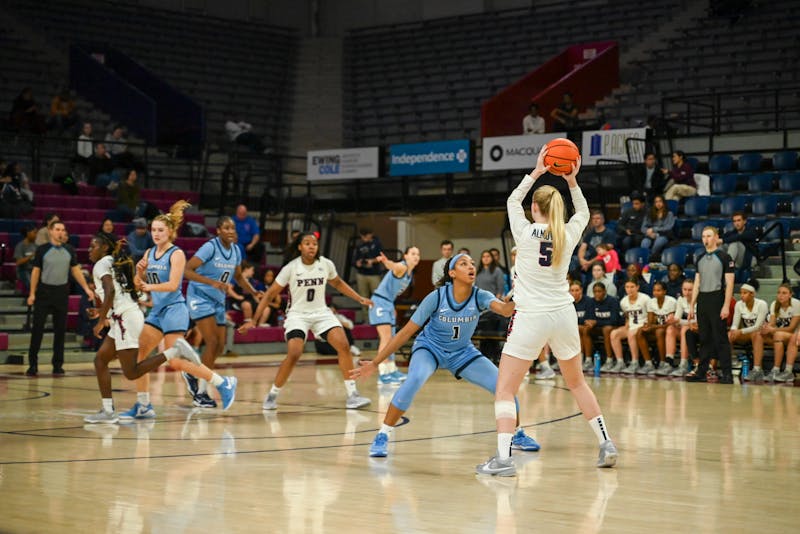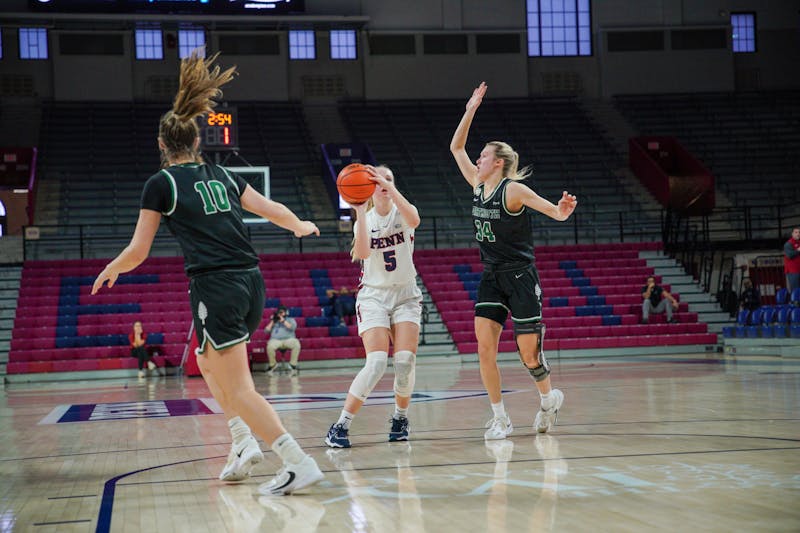
5 a.m. 5:15 a.m. 5:50 a.m.
Three morning alarms ring.
Junior swimmer Emma Stolberg, senior wide receiver Jared Richardson, and sophomore heavyweight rower RJ Sylak wake up.
Stolberg makes her bed and cleans her room before heading to Van Pelt-Dietrich Library to do homework. Usually around this time the swimming and diving team goes to practice, but because Sheerr Pool is under renovation for this school year, the team has had to practice at Drexel. This year’s practice schedule looks different, so Stolberg can have a bit more time to study in the morning.
Richardson takes a shower and eats four hard-boiled eggs and fruit for breakfast.
Sylak gets ready for the 15-30 minute bus ride to Boathouse Row, several miles away along the Schuylkill River. It’s where the team practices, because the boats, or shells, are housed there. Today, he might bike there.
6:30 a.m.
Sylak leaves for practice.
6:50 a.m.
Richardson leaves for the football team’s first meeting.
8:50 a.m.
Stolberg heads to swim practice at the Drexel pool.
10:50 a.m.
Stolberg and Richardson finish their respective morning practices. Stolberg gets ready for classes. Richardson takes a much-needed nap for one hour.
“After football, I’m dead tired,” he said. “I take a nap every day. … I don’t think there’s more than, I’d say, like 15 days where, in season and out of season … I didn’t take a nap.”
From after 12 p.m., the three athletes’ schedules diverge.
Depending on the day, Stolberg and Sylak might have afternoon practices for another two hours. Depending on the semester and whether or not they have swim meets, rowing races (called regattas), or football games, the three student-athletes’ practice schedules change, and their weekends may be taken up by travel.
With chunks of their day dedicated to their sport, classes have to fit in the time left over.
Penn football is not allowed to take classes before 12 p.m. On days when the rowing team practices morning and afternoon, there’s only time for 10:15 a.m., 12 p.m., or evening classes for Sylak. Sometimes, swimmers will have to go straight to class after practice. Dripping wet, hair frozen in the winter, smelling of chlorine, and somehow having to concentrate on Math 1400.
“Swimmers … may be the most productive people you have ever met,” Stolberg said, “because the scheduling — it sucks.”
And it does “suck” to have to pass on classes because of sports.
Instead of taking Spanish in high school, which would have counted toward her Penn language requirement, Stolberg had to take Malagasy, which was held twice a week instead of three. Many athletes take the class for the same reason she did: It just fit better into their schedules.
Sylak had to postpone a major requirement class — OIDD 2200 — to next semester so that he would miss only one practice every week instead of two.
For a sport such as rowing, players missing practice can mess up the whole team. In a sport where groups of eight or four athletes race together, rowers need to form a sense of unity with one another, so the groups in each boat are kept relatively consistent. “If you’re gone because you have class,” Sylak said, “that puts a big detriment on the boat and on the team as a whole.”
An early bird, Richardson would much rather take 8:30 a.m. classes and 10:15 a.m. classes to end the day early, but he can’t due to football practice in the mornings.
“I don’t have the luxury to do that,” he said.
In between and after classes, student-athletes work on assignments whenever they can, making use of any few hours they have left in a day.
“You just get it done when you get it done,” Sylak said.
Stolberg barely has time to eat, often consuming egg bites, protein bars, and cheese sticks to hold her over until dinner, when sometimes she feels like she’s a “massive football player eating anything in sight.”
When seeing her non-student-athlete roommate cook dinner, Stolberg remembered that it was normal to be able to cook dinner.
“I would love to have time to cook a meal,” Stolberg said.
Sylak also acknowledges that student-athletes “make a lot of sacrifices, you know, beyond sort of the normal weekend stuff.”
In another life, he would’ve considered studying abroad for a semester like some of his friends. But, as a rower, he has to stay on campus even over spring break to practice and compete.
For Richardson, who hopes to play football professionally, there is nothing else that could compete for his time outside of classes and football. He understands that everyone, even among his teammates, has different priorities, but for someone who wants to take his passion to the highest level, Richardson keeps himself on a strict schedule.
“My fraternity is the football team,” he said. “I obsess over football.”
That doesn’t mean he, or any other student-athlete, doesn’t have a life outside of their sports.
Richardson is doing his capstone project this semester, studying slavery and the conditions of transatlantic slave ships. He hopes to go into health care administration in the future. Stolberg is part of a sorority, and though she isn’t as involved as she would like because of time constraints, she still does hang out with her bigs. Sylak is involved in a myriad of clubs, including but not limited to Wharton Undergraduates in Public Policy and Wharton Undergraduate Aerospace Club.
Student-athletes have to use their time wisely, and that means making different decisions than others around them. Stolberg attends classes even when she’s sick because all of her excused absences have to be used for swimming and diving meets. Both Sylak and Richardson are not involved in greek life on campus, going to bed earlier than the average college student.
“It’s really funny,” Sylak said. “Because there will be things happening in a group chat for a class project, and you’ll just wake up to 30 unread messages, and you’re trying to piece your way through what happened after you went to sleep.”
There are also conflicts in their personal lives or breaks with athletic commitments beyond class scheduling. Stolberg’s younger sister half-jokingly asked her to “quit swimming,” so they could have time to call. Stolberg said she consistently feels like she’s running around with her head slightly cut off, Sylak has to compete even during finals and into the beginning of June, and Richardson has to be on campus for parts of the summer for 6 a.m. workouts — for which he wakes up at 4:30 a.m.
But these small sacrifices are worth it for their sports.
“It’s a lot, but I signed up. I chose this life and decided to be a college football player, and I’m gonna live with it,” Richardson said.
8:30 p.m. 9:30 p.m.
Lights out.
The Daily Pennsylvanian is an independent, student-run newspaper. Please consider making a donation to support the coverage that shapes the University. Your generosity ensures a future of strong journalism at Penn.
Donate









